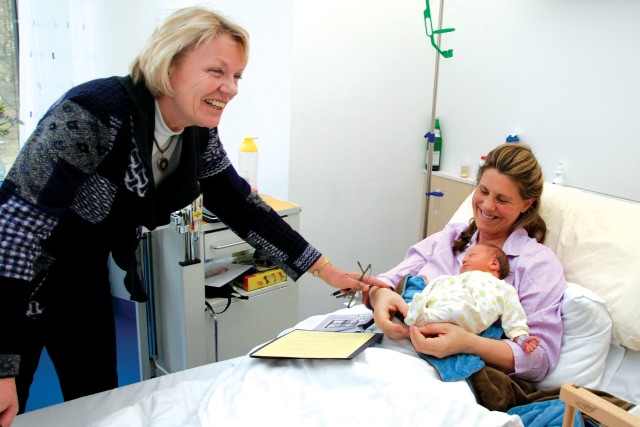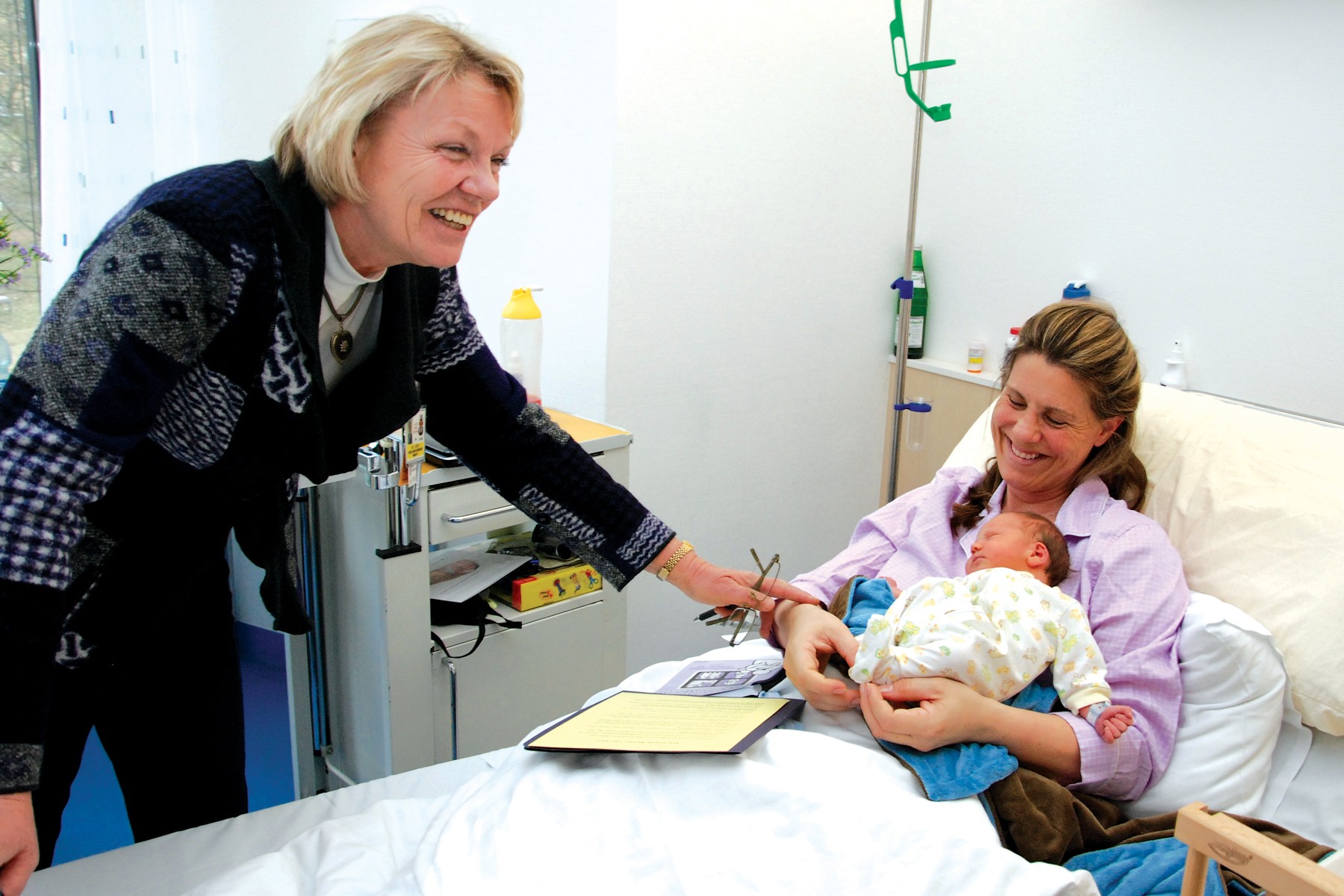
STUTTGART, Germany -- In the United States, when military community members need to visit the hospital, they simply drive to the closest one - usually, a military hospital on base.
For many overseas military communities, however, there is no military hospital available.
That's where patient liaison coordinators come in.
"When people are sick, their tolerance level of things that are different is at rock bottom," said Rosi Sipley, a U.S. Army Garrison Stuttgart patient liaison. "Our job is to ease the transition between military hospitals in the U.S. to [hospitals in] Germany."
As part of the TRICARE system, patient liaisons help military community members navigate the host nation medical system. The liaisons speak the host nation language, visit patients in local hospitals, and provide information on cultural medical practices and customs.
"The patient liaison role is crucial to the community because they smooth out all the bumps that come from the communication between the host nation and the [Stuttgart health] clinic," said Effie Watson, TRICARE supervisor. "They follow up with a patient from the moment they get hospitalized to the moment they get discharged."
There are currently five patient liaison coordinators for the Stuttgart military community, with plans to hire a liaison supervisor by May, according to Col. Kirk Eggleston, U.S. Army Health Clinic Stuttgart commander.
Liaisons take turns being on call around the clock for emergencies.
To reach a liaison, community members must call the Military Police, who give the liaison the caller's information and phone number. Then, a liaison calls the community member back and helps determine which hospital to go to - not necessarily the nearest one.
"Stuttgart has 27 different hospitals," Eggleston said. "They don't all have the same capabilities. [Calling a liaison] saves you some running around."
Most patient liaisons are familiar with all the doctors in town, and can match patients up with doctors with whom they think the patient could have good relationship, he added.
The liaisons notify the hospital staff when an American patient will arrive and are available to help translate during the first meeting and other appointments with a German doctor upon request.
Liaisons also help explain cultural differences to American patients.
"Europeans are not modest," Sipley said. "You do not get a sheet cover-up when you go to the gynecologist. That's not how things work."
In addition, German doctors do not expect patients to inquire about their medications or treatment process, she added.
"We were hired to help [American patients] understand these differences," Sipley said.
In addition to what liaisons can do, community members should be aware of what they cannot do, Eggleston said.
For example, liaisons cannot diagnose a condition.
"The liaisons are here to assist with cultural and language issues," he said. "While they may have some medical knowledge, they're not doctors or nurses."
When not on call, the liaisons in Stuttgart visit an average of 15 patients and eight hospitals each weekday, Sipley said.
Liaisons support active duty service members, retirees, reservists, and their family members.
However, the benefits are only available to those who call. Otherwise, the liaisons may not know that a community member is in the hospital.
"We don't have a system to get that information directly," Eggleston said. "If you get admitted to a hospital, notify the liaisons through the MPs. It's easy."
Gloria Colon-Buzatu, a military family member in the Exceptional Family Member Program, said she learned first-hand how important it is to call a patient liaison during hospital stays.
When she first went to a German hospital for bulging discs in her back, she just checked herself in.
She said she didn't know that she needed to notify a liaison, or that her triple-patient room and "bread-and-cheese meals" were not the kind of treatment TRICARE patients are entitled to, she said.
Everything changed when the patient liaison coordinators came to visit.
Colon-Buzatu was moved to a semi-private room with one other patient, and received higher-quality meals, she said.
"After they came, it resolved a lot of issues," she added. "TRICARE patients are treated as private patients. My care was not with the chief doctors. When they showed up, it was instantly chief doctor-only."
In addition, the liaisons helped her tell the doctor what was wrong.
"They were instrumental in helping me feel that my symptoms were actually being translated; there was nothing lost in what I had to explain," Colon-Buzatu said.
"It's especially important, if you come over here with EFMP, to really get to know just who these people are before you have a crisis ... whether you're prone to getting sick, or even if you're not," she added. "I just wish more people were aware of what that procedure is."
While Colon-Buzatu's situation was rectified, Sipley said that hospital patients should not wait to call the patient liaison office for help until they have concerns about their treatment.
"Don't wait until you're at the frustration point," Sipley said. "If there's something you don't understand, that's the time to call."
Patient liaisons are more than just translators; they provide moral support, Sipley said.
"Every day is different. We have patients ... with kids that break an arm," Sipley said. "We had a patient with a brain aneurism."
The process of helping patients can be emotional, but it's worth the tears, she said, adding, "I find people are thankful that you're helping them."
Chaplain (Maj.) David Santiago Cruz, USAG Stuttgart family life chaplain, is one military member grateful for the extra help when he put his life in someone else's hands - literally.
Santiago underwent quadruple bypass heart surgery at the Robert Bosch hospital last year. The surgery was fairly sudden. One day, while practicing for a physical training test, Santiago felt "heartburn." A few days later, a doctor discovered that he had four blocked arteries.
"I was very close to having a massive heart attack," he said. "I went to TRICARE and told them I needed open heart surgery. That was a very intense process. They made it very easy for me. From the TRICARE people to the staff - they were just nice to me," he said.
In the days leading up to the surgery, a patient liaison also took care of Santiago's paperwork, he said.
"For me, that was a real blessing," he said. "I was pretty stressed out, and physically, I was not in good shape to do much.
"For them to take care of those things for me and to give me direction of what I needed to do ... they freed up some time for me to relax and took the stress of the whole process from me," he added.
Within weeks, Santiago was undergoing surgery.
"Someone had my heart in their hands for five hours," he said.
However, both the hospital staff and patient liaisons gave Santiago and his wife confidence during an emotional time, he said.
"I know Loida also appreciates everything they did for me," he said
For another community member, the liaisons' support made the difference between what could have been a very trying experience to a pleasant three-month stay in a German hospital.
Amelia Johnson, a family member, had a stressful pregnancy from the start.
"Because I had a miscarriage before, I knew it was going to be a high-risk pregnancy," she said.
So, when Johnson started feeling poorly mid-pregnancy, she called the TRICARE office and visited a hospital in BAfAPblingen.
Johnson had pregnancy-induced diabetes, and ended up staying in the hospital for three months. While in the hospital, she also had emergency surgery for appendicitis.
"TRICARE was there every day," she said. "If I didn't understand people in the hospital, they would come and translate. They were a really big help."
"I'm really grateful to everybody from TRICARE and for the hospital people," she said. "I feel that if I'm ever going to be pregnant again, I'll [have my baby] here. They'll make sure I'm OK."
Patient liaisons also help prepare German birth and death certificates, offer local hospital tours, help plan transfers between host nation and military hospitals and coordinate tests and follow-up care.

Social Sharing